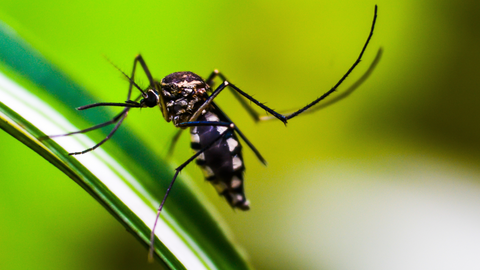Greetings, dear readers,
What a year it's been for insect activity! The UK has witnessed an unprecedented surge in biting insects, making it paramount for us all to remain informed and vigilant. This surge can largely be attributed to the effects of climate change, a harbinger of what's to come. To help you grasp the significance of this year's events and why staying vigilant is still crucial, particularly at this time of year as insects prepare for diapause (hibernation) and their activity increases, we've compiled a roundup of key occurrences.
- Beware: Mosquito-Borne Diseases Are Closer Than You Think
- A vital reminder about the potential risks posed by mosquito-borne diseases. It underscores that these diseases are not confined to remote or tropical areas but can impact densely populated regions as well. We strongly recommend taking precautions, such as using mosquito repellent and eliminating stagnant water where mosquitoes breed. Read more here.
- The Hidden Dangers Lurking in UK Parks
- This insightful article delves into the potential hazards in the form of ticks that park-goers might encounter throughout the UK. It covers everything from toxic plants to wildlife encounters. The blog emphasizes the importance of being cautious and aware of one's surroundings while relishing outdoor activities.
- The Rise of the Asian Hornet
- This blog post shines a spotlight on the escalating presence of the Asian hornet, a species known for its aggressive behaviour and potent sting. It underscores the potential dangers this insect poses to both humans and local ecosystems. We encourage everyone to be on the lookout for these hornets and promptly report any sightings to the relevant authorities.
- Battling Bed Bugs: The Paris-London Infestation and Java Citronella Oil Solution
- There have been recent concerning issues of bed bug infestations in major metropolitan areas like Paris and London. Read here to learn more and why it introduces Java citronella oil as a natural solution to combat these pests. The article provides valuable insights into how this oil can be used effectively to repel and deter bed bugs, offering a potential alternative to chemical-based treatments.
As the seasons transition and biting insects like mosquitoes and hornets gear up for diapause—a period of dormancy—it's crucial to reiterate the importance of staying alert. We strongly advise continuing the use of insect repellent, donning protective clothing, and maintaining cleanliness in living spaces to minimize the risk of encounters with these insects. Remaining proactive and vigilant is paramount in safeguarding against insect-borne hazards.

Exploring Mosquito Diapause: A Crucial Survival Technique
While not all creatures in the arthropod family employ diapause, many, including mosquitoes, do. Diapause is a common biological tactic used by insects to enter a state of dormancy when faced with less-than-ideal environmental conditions, like changes in temperature, daylight duration, and food availability.
So, what exactly happens during a mosquito's diapause phase?
Diapause represents a pivotal period in a mosquito's life cycle, serving as a form of hibernation when breeding and reproduction become less favourable. This adaptation is especially noteworthy because it shields their offspring from harsh conditions where activity would be impractical.
The Diapause Journey:
- Pre-diapause: This optional diapause is set in motion by specific environmental cues before the insect enters dormancy. Shortened days and diminished light and warmth act as reliable signals, foretelling the arrival of winter. This process influences their internal clock, a phenomenon known as 'photoperiodism,' making them more attuned to seasonal shifts.
- Diapause: This is the actual phase where larval development is put on hold or modified, making them unresponsive to typical developmental cues. It prompts a metabolic slowdown, with the mosquito accumulating fat to endure the colder climate. During this period, genes responsible for fat breakdown decrease in activity, while those involved in fat storage ramp up.
- Post-diapause: After emerging from diapause, mosquitoes re-enter a similar state, akin to a period of rest. Their metabolic rate stays low, but they become receptive to environmental factors. When conditions turn favourable, the embryos emerge in spring, capitalizing on warmer weather and longer days.
Comprehending these diapause phases not only offers insights into the survival tactics of mosquitoes, but also provides valuable knowledge about their impact on ecosystems and potential patterns of disease transmission.
Now that you’re aware of the mosquito diapause cycle – what does this mean in terms of insect behaviour at large and how it can affect you and your loved ones? Read on to learn some useful (and intriguing) facts!
- Big Appetites:
- Some insects, like mosquitoes and hornets, exhibit an increased appetite. They're akin to avid snackers, stocking up on energy for their dormant period. For this reason, we advocate having our trusty incognito insect repellent spray within arm's reach. It's your essential ally, a must-have year-round. It effectively wards off an array of insects and bugs—from mosquitoes and hornets to ticks and bed bugs.
- Feisty Friends:
- Certain types of hornets can become a tad feisty as they gear up for their nap. It's as if they're prepping for an extended slumber, and they might be a bit grumpy. It's best to give them some space.
- Looking for Cozy Spots:
- Insects embark on a quest for snug spots to curl up in for their nap. They revel in discovering snug hideaways like cracks, crevices, and even cozy corners indoors. It's akin to a quest for the perfect nap nook!
- Taking It Easy:
- As they prepare for their nap, insects slow down and become less active. They're akin to sleepyheads in pyjamas, taking it easy.
- Saving Up Energy:
- Insects in diapause conserve energy, effectively entering 'power-save' mode. This enables them to endure longer periods without sustenance. It's akin to them hoarding energy for later.
- Ageless Magic:
- During diapause, insects can live significantly longer than their usual lifespan. It's like they've unlocked the secret to perpetual youth!
- Break Time from Babies:
- Insects typically take a hiatus from procreation during diapause. It's like they're saying, 'Let's save the family planning for later!'
Now, here's a golden nugget of advice: keep your favourite incognito insect repellents nearby during this time. They're your trusty sidekick, ensuring you're shielded when insects are more active. With incognito, you've got a steadfast defender against those intrepid explorers.
Remember, these transformations can vary depending on the type of insect and their habitat. It's always wise to be considerate and cautious around insects during this period. And if you ever need assistance with pests, incognito is your reliable partner.
Wishing you a safe and insect-aware season ahead!
Warmest regards,
The incognito team




Comments (0)
There are no comments for this article. Be the first one to leave a message!